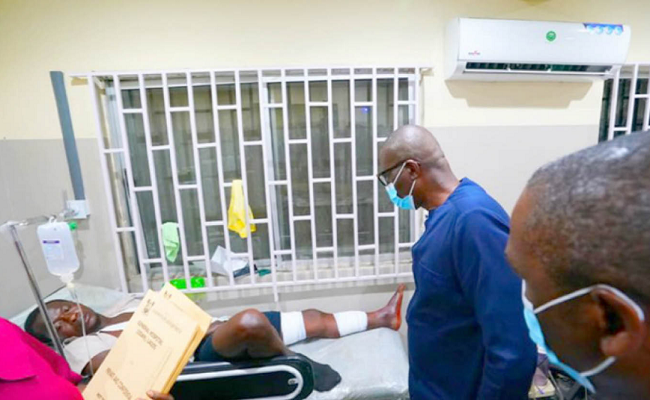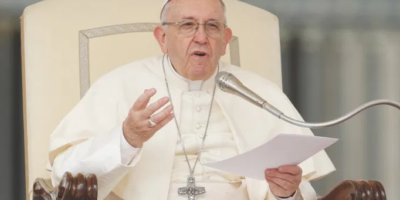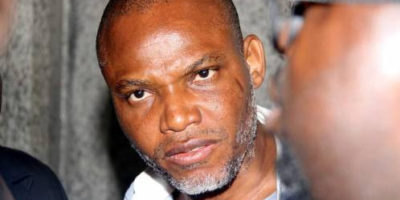Lekki Shootings: Untold Story Of Survivors

Victims of the Lekki tollgate incident have narrated how they were shot allegedly by armed uniform men on the night of Tuesday, October 20.
The survivors said many victims of the shooting escaped death by the whiskers, while hospitals sources confirmed that they (victims) were treated for gunshot wounds.
Since the incident, there has not been an accurate data on the number of casualties recorded that night, a development which has led to various groups churning out different figures.
Speaking to Daily Trust, some of the victims said they were treated in hospitals such as Reddington Hospital, Lekki; the Vedic Lifecare Hospital, Lagos also in Lekki, St. Nicholas, and General Hospital Odan, Lagos Island.
Findings by Daily Trust showed that many of the hospitals treated victims of the shooting who were rushed there by the protesters while other victims with mild injuries were treated in other private hospitals. Daily Trust has not been able to independently verify some of the claims made by the victims. Both the Army and police have denied shooting the protesters.
Youths under the #EndSARS had taken to the streets to protest against police brutality, calling for the disbandment of the unit. The unit was subsequently disbanded and a replacement announced by the police authorities.
This did not however quell the protests as the youths insisted that the action must go beyond disbandment of the unit, thereby the protests continued.
On Tuesday, last week, the Governor of Lagos State, Babajide Sanwo-Olu, imposed a curfew on the state, in an attempt to get the protesters off the streets.
Later that night, there were reports that military personnel had gone to the Lekki tollgate and shot at the protesters in a bid to disperse them.
Allegation and counter-allegations have continued to trail the incident. In its latest reaction, Amnesty International insisted that the protesters were shot.
Country Director of Amnesty International, Osai Ojigho, said “What happened at Lekki tollgate has all the traits of the Nigerian authorities’ pattern of a cover-up whenever their defence and security forces commit unlawful killings.
“One week on, the Nigerian authorities still have many questions to answer: who ordered the use of lethal force on peaceful protesters? Why were CCTV cameras on the scene dismantled in advance? And who ordered electricity being turned off minutes before the military opened fire on protesters?
But the Nigerian Army through its 81 Division said that soldiers were deployed at the instance of the state government.
A statement issued by 81 Division of the Nigerian Army and signed by its Public Relations Officer, Major Osoba Olaniyi, said the allegations bordering on massacre were untrue and unfounded.
On his part, Lagos State Governor, Mr. Babajide Sanwo-Olu, said those behind the shootings would be brought to book.
He said this in a statement by his Chief Press Secretary, Gboyega Akosile, on Monday.
The statement quoted the governor as speaking during an interview session on CNN.
Sanwo-Olu said the federal government and Lagos State Government would ensure that anyone found culpable would be held accountable for their actions.
How I was shot, treated – Comedian
One of the victims, Agbeze Ifeanyi, a comedian narrated his ordeal to Daily Trust. He said he was shot at around 6:50 pm on the fateful day by soldiers whom he said came from the direction of the Oriental Hotel.
According to him, immediately the soldiers arrived, they shot into the air before turning to shoot at the protesters without any engagement with them.
He said a bullet hit him in the chest and pierced through the back and that he was rushed to the Lagos Island General Hospital from where he was referred to the Lagos State University Teaching Hospital (LASUTH) Ikeja for treatment.

We were at the protest ground and heard that there would be curfew that night. We had been there for the past 11 days and that Tuesday would be the 12th day, but nobody was ready to go home. We were determined to achieve our #5for5 objective. We were not holding guns or any weapon; we were singing the national anthem.
I was in front of the stage when the soldiers arrived. They continued to shoot but they saw that the protesters sat down on the floor and many people were shivering. In the process, someone fell on the floor but I was able to pick the person up and immediately I picked him up, he ran. I was also going to run when I was shot at, as you can see, in my chest.
Agbeze, who hails from Ebonyi, but was brought up in Ondo State, said he had been part of the protest at Lekki tollgate from day one when it all started.
He said he was one of those initially declared dead on social media, few hours after the shooting as many thought he was dead until the third day when he was able to reach out to colleagues and relatives that he was at the Lagos State University Teaching Hospital (LASUTH).
He added:
When I was shot, I didn’t know where to run to. Then I ran back to the stage. I heard somebody saying this guy has been shot. It was at that point that I fell down and people rushed me to the hospital.
When they took me to the hospital, I was attended to immediately. I heard the doctor having a conversation with someone on the phone, telling him I had another hole in the back. So, they stitched the two holes and the doctor was given an order to transfer me to LASUTH.
They took me there around 1:00 am. I was admitted there until yesterday (Wednesday) when they discharged me. They said I should not worry about any payment that the governor said they should not collect money for treatment from anybody shot at Lekki tollgate.
He said when he left LASUTH; he had to go to another private hospital to take care of himself because he was still having pains.
Police also shot, fired teargas – Bouncer
Another survivor, Onileowo Agboola Legend, who worked as a bouncer, in his own account, said when the Army left after shooting at the protesters, another group of mobile police officers stormed the arena.
Some private security guards, popularly known as bouncers, had volunteered to provide security at the venue of the protest, following reported attacks by suspected hoodlums at some venues.
He said:
I was one of the bouncers that day. Around past 6:00 pm, the military came and started shooting from the first entrance. So, everybody from the first entrance all ran for their lives. Some bouncers had to jump into the river beside Oriental.

The soldiers kept shooting till they got to the protest ground. The only thing we were holding was the Nigerian flag. We thought once they got there, they would see what was going on, we were singing the national anthem, but surprisingly they were shooting at us.
When they saw that we were not backing down, they started shooting into the air. So, we now took the dead bodies of those that were gunned down to the feet of the soldiers, like four to five people.
After about 30 minutes, their commander came to address us and said he didn’t instruct them to shoot at us, but only told them to shoot in the air to scare us. We told the Colonel that his men shot at us and people died. He then asked his men to leave and the soldiers took the dead bodies away.
The graduate of Criminology said after the Army left, the police came in three buses and started firing teargas canisters at them, thereby causing a stampede.
I was at the front with my flag and the police were advancing. We instructed everybody to sit down. When we were trying to take cover, I was surrounded by policemen and they were hitting me with their AK-47 rifles. They hit me on the head. I had to pretend as if I was dead.
Shortly after, they started shooting other protesters, chasing them and shooting them. I was able to take pictures of people that were shot after me. One was shot in the head and blood was everywhere. I took the picture,
he added.
He said he had to hide around the river bank where he posted his pictures and video online to seek help.
It was when I posted my video online that I received some calls and people contacted an ambulance. The ambulance came in the morning and took me to a hospital called Primefort Hospital around Agungi, where I was treated. I was the only one the ambulance picked that morning but we couldn’t find any dead body,
he added.
Two officials of the Primefort Hospital, who were among those that attended to the victim, confirmed that he sustained injuries in his head and left elbow.
Our men were not at Lekki – Police
However, the Nigeria Police Force dismissed allegations that its personnel were also at Lekki tollgate. In a telephone interview with one of our correspondents, Force Public Relations Officer, DCP Frank Mba, wondered why the survivors mentioned police in their accounts.
He argued that no single video in circulation on social media had shown police officers were involved in the alleged massacre.
Good enough today, anything that happens, citizens will capture them, in all the videos you’ve seen, have you seen anything that looks like a police beret, a policeman in the whole of the videos you’ve seen?
Mba queried.
He added,
My response to this is that policemen never participated in Lekki shooting or anywhere, we did not! You will not find any police operational footprints around the tollgate.
Another witness speaks
Another protester, who simply gave his name as Inyene narrated how he survived the incident. According to him, as a documentary photojournalist, he had been documenting the protest on the Island including Lekki, Ikoyi and Chevron among others.
Tuesday was a normal day. The governor announced the imposition of a 24-hour curfew. I was at the toll gate thinking that people will disperse but I saw a new kind of energy and also because some of the protesters who reside far away from Lekki felt they might not get home before 4 pm.
The coordinator asked protesters to leave except those that would remain for 24 hours. At that point, my phone battery was flat, so I decided to go inside my friend’s car to recharge. While I was charging my phone in the car, I saw a staff member of LCC bring down the camera at the toll gate and took it into their office.
At about 3.30 pm, I put up my phone, and then the coordinator had announced that by 4 pm, we should all sit down, hold the Nigerian flag, which was shared to everyone, and chant the national anthem. Some of my friends who got to know that I was still on the protest ground came to join me. I called my friend documenting the Alausa protest, he told me that the military was at the ground at about 5 pm but nothing happened, so I felt very relaxed,
he said.

Inyene said at about 5:00 pm, the billboard light at the toll gate went off completely.
The billboard had served as a source of light to us. So around 6.45 pm, some people ran from the Oriental axis towards the toll gate. At that moment, the coordinator announced again that we should all sit on the floor and raise the flag. Because I was there to do my job, I was taking snapshots to document what was happening. Due to fear, some people were hiding behind the barricades.
Then the military came, parked their vehicle around Oriental axis. They took position and less than 1 minute after; they started shooting into the air. The people were afraid and started running, scampering for safety. I observed that the military was strategic, as they shot, they moved forward and it continued like that. Later I went to hide under my friend’s car while the crowd was screaming. All the military officers came with torchlight. I noticed again that I needed closer shots, so I stylishly left under my friend’s car. As I stood up to sneak back into the crowd, one of the soldiers flashed his torchlight at me.
Immediately, I raised my hands and my flag, so I walked back into the crowd. While I thought the soldiers were still shooting into the air, I heard people shouting ‘my leg’, ‘my hand’ etc. I noticed a bullet had hit a young man in his lap.
We assisted him to pull his jeans and it was a big cut. I later observed that the military had started spreading, trying to surround the protesters, so I decided to run away from the protest ground. I ran towards Lekki Phase 1, because the military had blocked the Oriental axis. When I was running, I saw two bodies on the ground but I cannot confirm whether they were alive or dead.
LASUTH, others confirm treating victims
The management of Lagos State University Teaching Hospital (LASUTH) confirmed that Agbeze was discharged from its facility in stable condition.
The Chief Medical Director, Prof. Adetokumbo Fabanwo said:
The only thing needed was dressing of the bullet entry and exit wounds, which were to be continued by him (Agbeze) as an outpatient.
Other hospitals also confirmed treating victims with bullet wounds. A source at Vedic Hospital, who spoke with our correspondent on condition of anonymity because he was not authorised to talk to the press said the hospital treated nine people with bullet wounds.
Also, our correspondent visited Reddington Hospital where it was gathered that all the victims, about 10 who were brought to the hospital had been discharged. However, the official could not give us the details of the patients treated and referred our reporter to the state Ministry of Health.
Activist faults claims
Mr. Akin Olaoye, an activist, who is championing the cause of the Lekki victims faulted claims by Lagos State governor that only two persons died in the incident and that of the military that soldiers didn’t shoot at protesters.
Right now, in our camp, we have 14 survivors with gunshot wounds. We have two that have bullets in their lungs and need to extract the bullets.
They can keep lying but we are not in a rush to put out information that is not factual. We are keeping some of our information for evidence collation.
We are still gathering evidence. We made videos of the hospitals we took some of the victims to, we are tracing those victims but some are being paid off while others are disappearing. The goal is not to state what we cannot back with facts,
he said.
He said the group had made a formal request that the Lekki massacre should not be part of the judicial panel set up by the Lagos State Government.
This is a case of crime against humanity, not just a case against police brutality or extortion or bribery or misbehavior by security operatives. This has to go to the highest court of the land. The military will likely not submit themselves to the panel that is holding. The jurisdiction of the panel is not sufficient to handle the incident (Lekki shooting),
he said.

Justin Nwosu is the founder and publisher of Flavision. His core interest is in writing unbiased news about Nigeria in particular and Africa in general. He’s a strong adherent of investigative journalism, with a bent on exposing corruption, abuse of power and societal ills.













